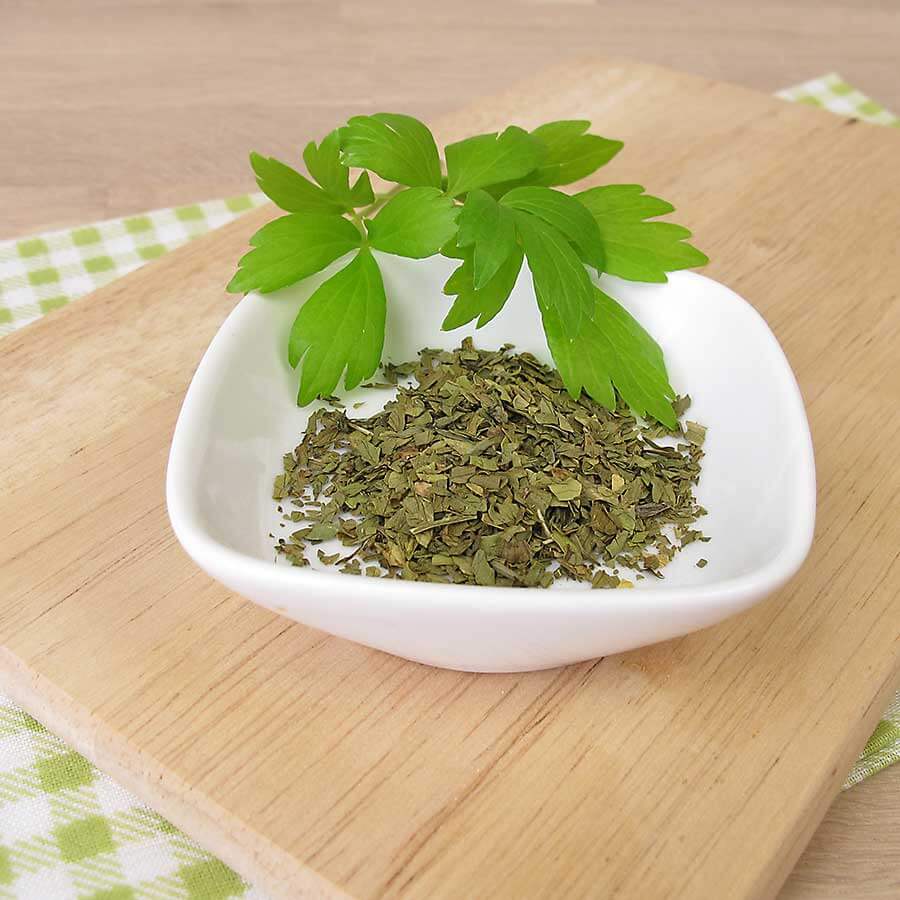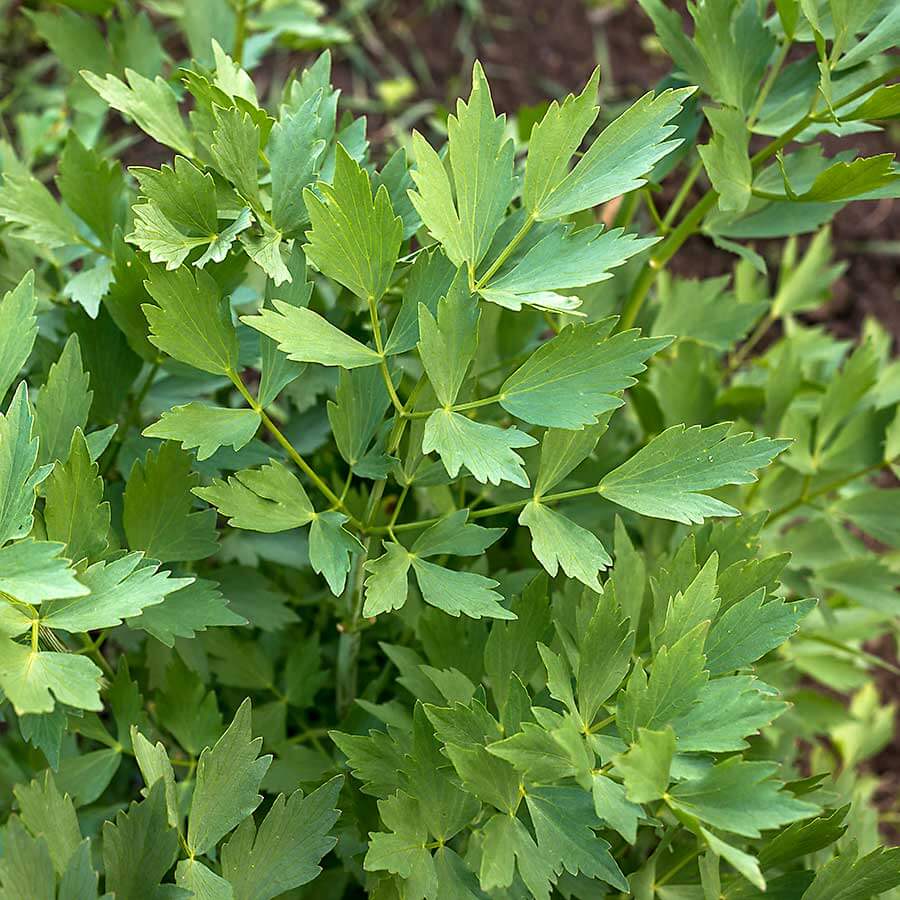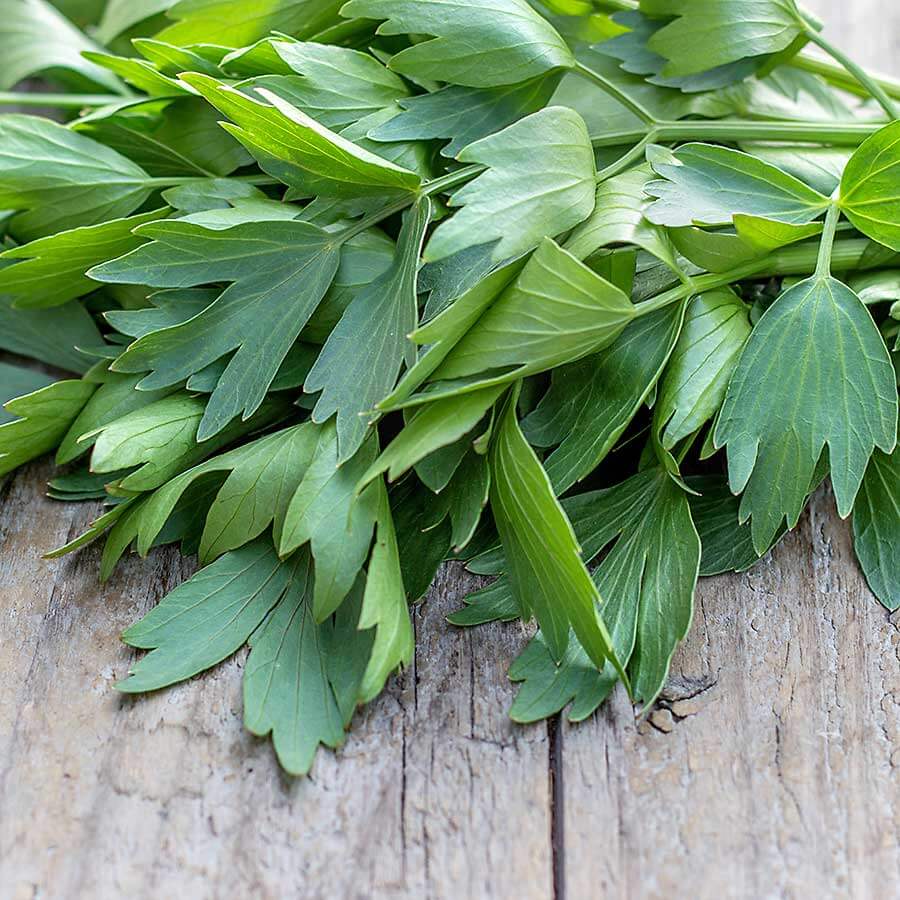Lovage
Lovage is a perennial plant that is a member of the parsley family. While the name of this tall leafy herb sounds quaintly delicate, it still packs plenty of punch. Lovage’s flavour is often compared to celery – and in French it’s known as céleri bâtard or false celery. The German and Dutch common names, which reference Maggi soup seasoning (respectively, maggikraut and maggiplant), give more of a clue as to its complexity of flavour.
The name “lovage” comes from the words “love-ache”, ache being a medieval name for parsley. In Czech it is known as is libeček, and in Polish it is lubczyk, both meaning “love herb”. In Germany and the Netherlands, one of the common names of lovage is Maggikraut (German) or Maggiplant (Dutch) because the plant’s taste is reminiscent of Maggi soup seasoning.
The lovage has yellow flowers which bloom during the summer and die as autumn comes. Lovage flowers have a very intense scent. The seeds, roots and leaves of the plant are all widely used for various culinary purposes in Europe. Lovage was introduced to Europe by the Romans, who used it not just as a flavouring agent but as a medicine for treating stomach aches and fevers. Today, lovage is commonly used in the dishes of European Cuisine.
Even though true lovage is a native of Southern Europe, it is widely cultivated in countries such as Germany, Poland, Hungary, France, Czech, Italy, the United States as well as western Asia. Additionally, there are two main types of lovage that grow wild – sea lovage and lack lovage. Sea lovage is also referred to as shunis or Scottish lovage are found in parts of Britain and the U.S. Black lovage, on the other hand, are found to grow wild in Britain and some parts of the Mediterranean. They are also referred to as alexanders.
What does lovage taste like?
The taste of lovage is most often compared to celery, though it has a much stronger flavour than celery. It also has undertones of parsley and a hint of anise flavour. Lovage has a strong enough flavour to be used as a spice and add flavour to dishes, but is also mild enough to be paired with seafood and poultry without being too overwhelming in taste.
How to use lovage in cooking
All parts of the lovage plant can be used in cooking. You can chop up its leaves and add them to any dish as you would celery, including salads, soups, stews, frittatas, egg salad, and potato salad. Lovage has a stronger flavour than celery so be mindful of this when using it in cooking. For those who like Bloody Mary cocktails, a lovage stalk can be used in place of celery. The seeds of the lovage plant can be used to make cordial, and a popular medieval recipe included both yarrow and tansy as well.
In modern culinary usage, lovage is most often added to soups, stocks, stews, and meat dishes. Just like celery, lovage laves and stems can be used in a dish, either whole or chopped. It has a much stronger flavour than celery, however.
Some popular uses of lovage in cooking include:
- Cooking lovage leaves with white asparagus and salt, and serving them with boiled eggs. This dish is popular in the Netherlands.
- In the Ukraine, lovage is known as an aphrodisiac. One tradition calls for lovage leaves to be brewed and used to rinse the hair, helping to attract men with it beautiful scent. The leaves and roots of lovage are also used as a spice in Ukraine and added to salads.
- In Romania, lovage leaves are just as popular as herbs like dill and parsley. They are most often used to flavour broths and soups. Dried lovage leaves and seeds are also used in Romania when pickling cabbage and cucumber, adding flavour and helping to aid the preservation of the pickles.
- In the UK, lovage cordial is a traditional accompaniment to brandy, served as a winter drink.
Medicinal uses of lovage
Besides its culinary use, the roots and rhizome of lovage are also often used in medicine. Some of the medicinal uses of lovage include:
- Irrigation therapy – Lovage is used to ease pain and swelling of the lower urinary tract, helping prevent kidney stones and increase the flow of urine.
- Aquaretic – The roots of lovage can be used to promote the excretion of water but without losing electrolytes.
- Digestion – Lovage can be used to treat digestive issues such as indigestion, heartburn, bloating, and intestinal gas.
Lovage has also been known to help ease menstrual irregularity, sore throats, jaundice, gout and joint pain, as well as migraine headaches.
Private Chefs, Art of Dining
CHEFIN is a private chef platform that’s reimagining social dining.
You can easily connect with 1 of our 250 private chefs and treat your guests to restaurant-quality dining experiences in the comfort of your own home, office or chosen venue. From high-end dining to quirky social food experiences, the CHEFIN platform makes it effortless for you to access gourmet food that’s worthy of a Michelin-starred establishment.
What you get:
-
- Your very own private chef who is vetted and insured,
- A customised menu for your needs,
- 24/7 concierge support,
- Complete post-dinner cleanup,
- A fun, stress-free, and unforgettably dining experience!


